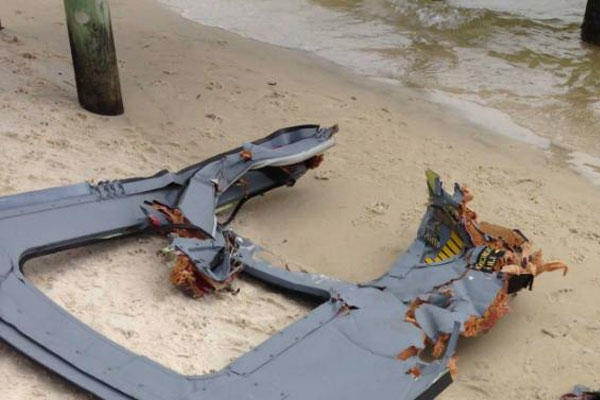Search and rescue teams began finding human remains Wednesday following the nighttime crash in dense fog off the Florida Panhandle coast of a Black Hawk UH-60 helicopter with seven Marines and four Louisiana Army National Guardsmen aboard.
The Black Hawk was believed to have gone down Tuesday night after a second Black Hawk aborted the training exercise because of poor visibility, said Maj. Gen. Glenn Curtis, adjutant general of the Louisiana Army National Guard. The area was under a dense fog advisory at the time and the second helicopter "turned around and came back" safely, Curtis said at a Wednesday news briefing from Hammond, La.
It was not immediately known if the first helicopter was aware that the second had turned back. The Army has started an investigation into the crash.
At the time the Black Hawk went missing at about 8:30 p.m. local time Tuesday, a nearby airfield was reporting visibility of one mile with dense fog and heavy mist. At Destin, Fla., where the two Black Hawks lifted off Tuesday night, visibility was three-quarters of a mile.
By Wednesday morning, visibility in the search area had dropped to a quarter mile, delaying the launch of search and rescue aircraft.
At his news briefing, Curtis said the pilots of both Black Hawks were "instructor pilots with thousands of hours of experience."
At about 2 a.m. Wednesday, parts of the Black Hawk fuselage, a wheel , crew equipment and other debris were found washed up on the beach off Santa Rosa sound near the Navarre bridge.
"We have found parts of the aircraft, we have found remains," Amy Parr, a spokeswoman for Eglin Air Force Base, said Wednesday afternoon.
Parr said that "this is still an active search and rescue operation," but other officials acknowledged fears that all 11 aboard the Black Hawk were lost.
Kim Urr, who works at a campground near where the helicopter went down, told The Associated Press that on Tuesday night she heard a strange sound followed by two explosions.
"It sounded like something metal either being hit or falling over, that's what it sounded like," she said. "And there were two booms afterward, similar to what you hear with ordnance booms, but more muffled."
Three Coast Guard small boats were quickly sent to the accident scene – a 45-footer from Coast Guard Station Pensacola and two 29-footers from Coast Guard Station Destin, said Lt. Lily Zepeda, a spokewoman for the 8th Coast Guard District in New Orleans.
At about 1:30 a.m. Wednesday, one of the Destin boats "found debris consistent with that of a military aircraft" floating in waters not far off the beach in Santa Rosa sound, Zepeda said.
President Obama expressed condolences to Marine commanders at Camp Lejeune, N.C., and to the Louisiana Army National Guard. At the start of a Pentagon briefing Wednesday, Defense Secretary Ashton Carter said of the 11 aboard the Black Hawk that "our thoughts and prayers are with them and their families as the search and rescue continues."
The seven Marines were from the Marine Special Operations Command (MARSOC) at Camp Lejeune and the four Black Hawk crew members were from the experienced 1-244th Assault Helicopter Battalion of the Louisiana National Guard based in Hammond, La.
The 1-224th was specially trained for rescues in hurricane season.
At Camp Lejeune, Capt. Barry Morris, a MARSOC spokesman, said the seven Marines on the Black Hawk had arrived in Florida on March 8 and were due to return to Lejeune on March 15.
Morris described the exercise as "routine training."
"We are working closely with all parties involved to locate our Marines and the Army air crew as soon as possible," said Maj. Gen. Joseph Osterman, commander of U.S. Marine Corps Forces, Special Operations Command.
-- Richard Sisk can be reached at richard.sisk@military.com





























